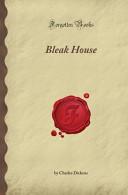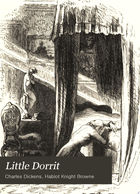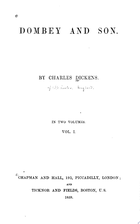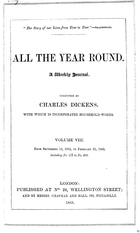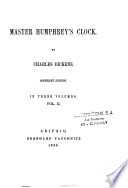“There is a wisdom of the Head, and … there is a wisdom of the Heart.”
Bk. III, Ch. 1
Hard Times (1854)
Charles John Huffam Dickens was an English writer and social critic. He created some of the world's best-known fictional characters and is regarded by many as the greatest novelist of the Victorian era. His works enjoyed unprecedented popularity during his lifetime, and by the 20th century, critics and scholars had recognised him as a literary genius. His novels and short stories are still widely read today.Born in Portsmouth, Dickens left school to work in a factory when his father was incarcerated in a debtors' prison. Despite his lack of formal education, he edited a weekly journal for 20 years, wrote 15 novels, five novellas, hundreds of short stories and non-fiction articles, lectured and performed readings extensively, was an indefatigable letter writer, and campaigned vigorously for children's rights, education, and other social reforms.
Dickens's literary success began with the 1836 serial publication of The Pickwick Papers. Within a few years he had become an international literary celebrity, famous for his humour, satire, and keen observation of character and society. His novels, most published in monthly or weekly instalments, pioneered the serial publication of narrative fiction, which became the dominant Victorian mode for novel publication. Cliffhanger endings in his serial publications kept readers in suspense. The installment format allowed Dickens to evaluate his audience's reaction, and he often modified his plot and character development based on such feedback. For example, when his wife's chiropodist expressed distress at the way Miss Mowcher in David Copperfield seemed to reflect her disabilities, Dickens improved the character with positive features. His plots were carefully constructed, and he often wove elements from topical events into his narratives. Masses of the illiterate poor chipped in ha'pennies to have each new monthly episode read to them, opening up and inspiring a new class of readers.His 1843 novella A Christmas Carol remains especially popular and continues to inspire adaptations in every artistic genre. Oliver Twist and Great Expectations are also frequently adapted and, like many of his novels, evoke images of early Victorian London. His 1859 novel A Tale of Two Cities is his best-known work of historical fiction. The most famous celebrity of his era, he undertook in response to public demand, a series of public reading tours in the later part of his career. Dickens has been praised by many of his fellow writers—from Leo Tolstoy to George Orwell, G. K. Chesterton, and Tom Wolfe—for his realism, comedy, prose style, unique characterisations, and social criticism. However, Oscar Wilde, Henry James, and Virginia Woolf complained of a lack of psychological depth, loose writing, and a vein of sentimentalism.
The term Dickensian is used to describe something that is reminiscent of Dickens and his writings, such as poor social conditions or comically repulsive characters.
Wikipedia

“There is a wisdom of the Head, and … there is a wisdom of the Heart.”
Bk. III, Ch. 1
Hard Times (1854)
Bk. I, Ch. 1
Hard Times (1854)
Source: Great Expectations (1860-1861), Ch. 39
“It is strange with how little notice, good, bad, or indifferent, a man may live and die in London.”
Characters, Ch. 1 : Thoughts About People
Sketches by Boz (1836-1837)
Context: It is strange with how little notice, good, bad, or indifferent, a man may live and die in London. He awakens no sympathy in the breast of any single person; his existence is a matter of interest to no one save himself; he cannot be said to be forgotten when he dies, for no one remembered him when he was alive. There is a numerous class of people in this great metropolis who seem not to possess a single friend, and whom nobody appears to care for. Urged by imperative necessity in the first instance, they have resorted to London in search of employment, and the means of subsistence. It is hard, we know, to break the ties which bind us to our homes and friends, and harder still to efface the thousand recollections of happy days and old times, which have been slumbering in our bosoms for years, and only rush upon the mind, to bring before it associations connected with the friends we have left, the scenes we have beheld too probably for the last time, and the hopes we once cherished, but may entertain no more. These men, however, happily for themselves, have long forgotten such thoughts. Old country friends have died or emigrated; former correspondents have become lost, like themselves, in the crowd and turmoil of some busy city; and they have gradually settled down into mere passive creatures of habit and endurance.
Our Parish, Ch. 5 : The Broker’s Man
Sketches by Boz (1836-1837)
Bk. II, Ch. 4
Hard Times (1854)
Characters, Ch. 2 : A Christmas Dinner
Sketches by Boz (1836-1837)
Context: Christmas time! That man must be a misanthrope indeed, in whose breast something like a jovial feeling is not roused — in whose mind some pleasant associations are not awakened — by the recurrence of Christmas. There are people who will tell you that Christmas is not to them what it used to be; that each succeeding Christmas has found some cherished hope, or happy prospect, of the year before, dimmed or passed away; that the present only serves to remind them of reduced circumstances and straitened incomes — of the feasts they once bestowed on hollow friends, and of the cold looks that meet them now, in adversity and misfortune. Never heed such dismal reminiscences. There are few men who have lived long enough in the world, who cannot call up such thoughts any day in the year. Then do not select the merriest of the three hundred and sixty-five for your doleful recollections, but draw your chair nearer the blazing fire — fill the glass and send round the song — and if your room be smaller than it was a dozen years ago, or if your glass be filled with reeking punch, instead of sparkling wine, put a good face on the matter, and empty it off-hand, and fill another, and troll off the old ditty you used to sing, and thank God it’s no worse. Look on the merry faces of your children (if you have any) as they sit round the fire. One little seat may be empty; one slight form that gladdened the father’s heart, and roused the mother’s pride to look upon, may not be there. Dwell not upon the past; think not that one short year ago, the fair child now resolving into dust, sat before you, with the bloom of health upon its cheek, and the gaiety of infancy in its joyous eye. Reflect upon your present blessings — of which every man has many — not on your past misfortunes, of which all men have some. Fill your glass again, with a merry face and contented heart. Our life on it, but your Christmas shall be merry, and your new year a happy one!
“It is a melancholy truth that even great men have their poor relations.”
Source: Bleak House (1852-1853), Ch. 28
American Notes online at Project Gutenberg http://www.gutenberg.org/cache/epub/675/pg675.html
Bk. I, Ch. 23
Little Dorrit (1855-1857)
Characters, Ch. 2 : A Christmas Dinner
Sketches by Boz (1836-1837)
Context: Christmas time! That man must be a misanthrope indeed, in whose breast something like a jovial feeling is not roused — in whose mind some pleasant associations are not awakened — by the recurrence of Christmas. There are people who will tell you that Christmas is not to them what it used to be; that each succeeding Christmas has found some cherished hope, or happy prospect, of the year before, dimmed or passed away; that the present only serves to remind them of reduced circumstances and straitened incomes — of the feasts they once bestowed on hollow friends, and of the cold looks that meet them now, in adversity and misfortune. Never heed such dismal reminiscences. There are few men who have lived long enough in the world, who cannot call up such thoughts any day in the year. Then do not select the merriest of the three hundred and sixty-five for your doleful recollections, but draw your chair nearer the blazing fire — fill the glass and send round the song — and if your room be smaller than it was a dozen years ago, or if your glass be filled with reeking punch, instead of sparkling wine, put a good face on the matter, and empty it off-hand, and fill another, and troll off the old ditty you used to sing, and thank God it’s no worse. Look on the merry faces of your children (if you have any) as they sit round the fire. One little seat may be empty; one slight form that gladdened the father’s heart, and roused the mother’s pride to look upon, may not be there. Dwell not upon the past; think not that one short year ago, the fair child now resolving into dust, sat before you, with the bloom of health upon its cheek, and the gaiety of infancy in its joyous eye. Reflect upon your present blessings — of which every man has many — not on your past misfortunes, of which all men have some. Fill your glass again, with a merry face and contented heart. Our life on it, but your Christmas shall be merry, and your new year a happy one!
Source: Great Expectations (1860-1861), Ch. 44
First lines of Dicken's first published work, originally titled "A Dinner at Poplar Walk" (1833), later published as "Mr. Minns and his Cousin"
Context: Mr. Augustus Minns was a bachelor, of about forty as he said — of about eight-and-forty as his friends said. He was always exceedingly clean, precise, and tidy: perhaps somewhat priggish, and the most retiring man in the world.
Lucy's Song in The Village Coquettes (1836); later published in The Poems and Verses of Charles Dickens (1903)
Context: p>Love is not a feeling to pass away,
Like the balmy breath of a summer day;
It is not — it cannot be — laid aside;
It is not a thing to forget or hide.
It clings to the heart, ah, woe is me!
As the ivy clings to the old oak tree.Love is not a passion of earthly mould,
As a thirst for honour, or fame, or gold:
For when all these wishes have died away,
The deep strong love of a brighter day,
Though nourished in secret, consumes the more,
As the slow rust eats to the iron’s core.</p
"A Dinner at Poplar Walk" (1833), later published as "Mr. Minns and his Cousin"
Context: There were two classes of created objects which he held in the deepest and most unmingled horror: they were, dogs and children. He was not unamiable, but he could at any time have viewed the execution of a dog, or the assassination of an infant, with the liveliest satisfaction. Their habits were at variance with his love of order; and his love of order, was as powerful as his love of life.
Letter to Edward Dickens (26 September 1868), published in The Selected Letters of Charles Dickens http://books.google.com.br/books?id=NJH1g1i4gnIC&printsec=frontcover&hl=pt-BR#v=onepage&q&f=false, Edited by Jenny Hartley
Context: I put a New Testament among your books, for the very same reasons, and with the very same hopes that made me write an easy account of it for you, when you were a little child; because it is the best book that ever was or will be known in the world, and because it teaches you the best lessons by which any human creature who tries to be truthful and faithful to duty can possibly be guided. As your brothers have gone away, one by one, I have written to each such words as I am now writing to you, and have entreated them all to guide themselves by this book, putting aside the interpretations and inventions of men.
Scenes, Ch. 22 : Gin-Shops
Sketches by Boz (1836-1837)
Source: Bleak House (1852-1853), Ch. 34
Source: Bleak House (1852-1853), Ch. 1
Bk. I, Ch. 10
Little Dorrit (1855-1857)
Comment while on an American tour (March 1842), as quoted in Dickens (1949) by Hesketh Pearson, Ch. 8
Source: Bleak House (1852-1853), Ch. 6
When found, make a note of."
Source: Dombey and Son (1846-1848), Ch. 15
La difficulté d'écrire l'anglais m'est extrêmement ennuyeuse. Ah, mon Dieu! si l'on pouvait toujours écrire cette belle langue de France!
Letter to John Foster (7 July 1850)
Bk. I, Ch. 24
Little Dorrit (1855-1857)
Source: Bleak House (1852-1853), Ch. 1
“The dignity of his office is never impaired by the absence of efforts on his part to maintain it.”
Our Parish, Ch. 1 : The Beadle. The Parish Engine. The Schoolmaster.
Sketches by Boz (1836-1837)
Source: Great Expectations (1860-1861), Ch. 1
Bk. III, Ch. 2
Our Mutual Friend (1864-1865)
Bk. I, Ch. 10
Little Dorrit (1855-1857)
Variant: Whatever was required to be done, the Circumlocution Office was beforehand with all the public departments in the art of perceiving — HOW NOT TO DO IT.
Source: Great Expectations (1860-1861), Ch. 4
“Pip, dear old chap, life is made of ever so many partings welded together…”
Source: Great Expectations (1860-1861), Ch. 27
“It is said that the children of the very poor are not brought up, but dragged up.”
Source: Bleak House (1852-1853), Ch. 6
Source: Great Expectations (1860-1861), Ch. 42
Source: Bleak House (1852-1853), Ch. 2
“Money and goods are certainly the best of references.”
Bk. I, Ch. 4
Our Mutual Friend (1864-1865)
American Notes (1842), Ch. 3
said I.
Source: Bleak House (1852-1853), Ch. 3
Source: Bleak House (1852-1853), Ch. 67
Source: Dombey and Son (1846-1848), Ch. 46
Source: Bleak House (1852-1853), Ch. 27
“The bearings of this observation lays in the application on it.”
Source: Dombey and Son (1846-1848), Ch. 23
“My guiding star always is, Get hold of portable property.”
Source: Great Expectations (1860-1861), Ch. 24
Our Parish, Ch. 5 : The Broker’s Man
Sketches by Boz (1836-1837)
"Administrative Reform" (June 27, 1855) Theatre Royal, Drury Lane Speeches Literary and Social by Charles Dickens https://books.google.com/books?id=bT5WAAAAcAAJ (1870) pp. 133-134
Bk. I, Ch. 2
Little Dorrit (1855-1857)
Source: Dombey and Son (1846-1848), Ch. 8
Source: Great Expectations (1860-1861), Ch. 27
Letter to Thomas Beard (11 January 1835), in Madeline House, et al., The Letters of Charles Dickens (1965), p. 53
“In love of home, the love of country has its rise.”
Source: The Old Curiosity Shop (1841), Ch. 38
in a private letter to Baronness Burdett-Coutts on 4 October 1857
“Resisting the slow touch of a frozen finger tracing out my spine.”
The Signal-Man http://www.charles-dickens.org/three-ghost-stories-the-signal-man/ebook-page-04.asp (1866)
Bk. III, Ch. 9
Our Mutual Friend (1864-1865)
Bk. II, Ch. 5
Little Dorrit (1855-1857)
Source: The Old Curiosity Shop (1841), Ch. 35
Source: The Old Curiosity Shop (1841), Ch. 57
